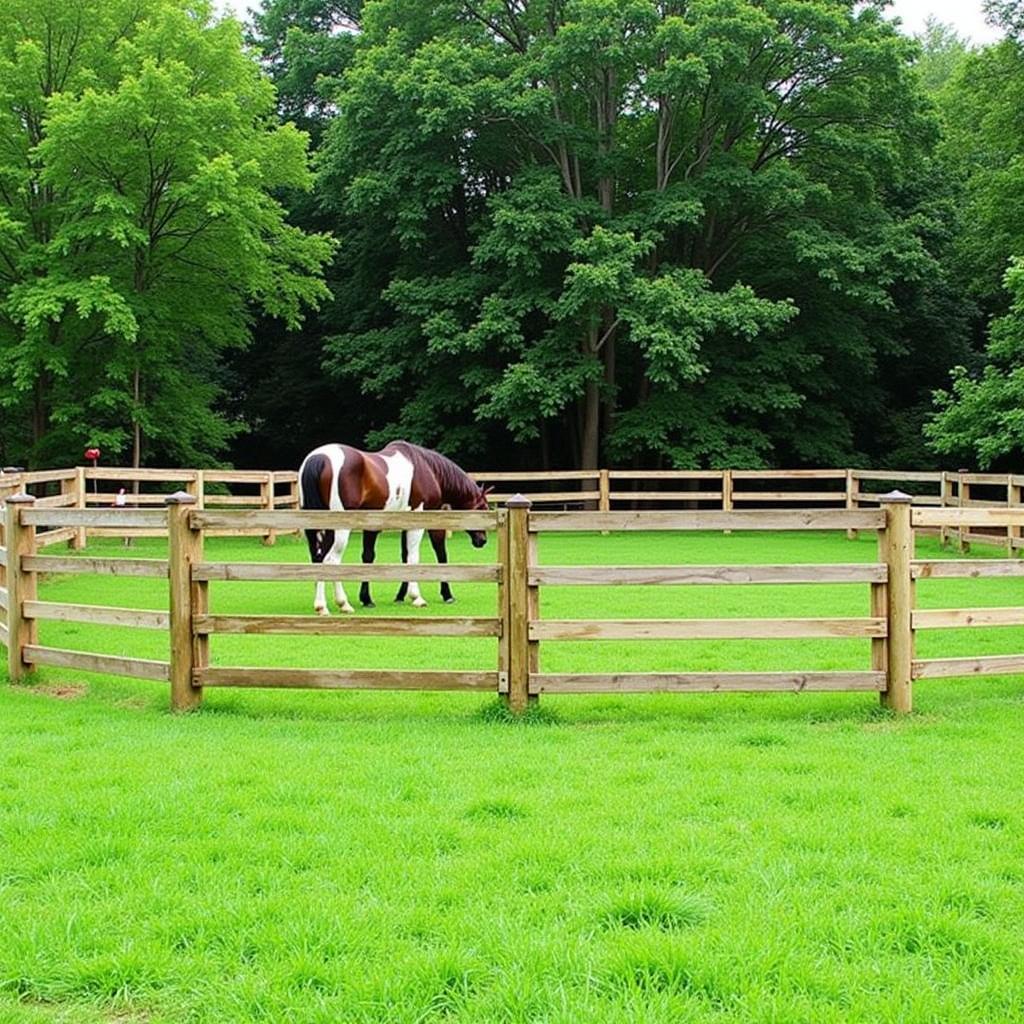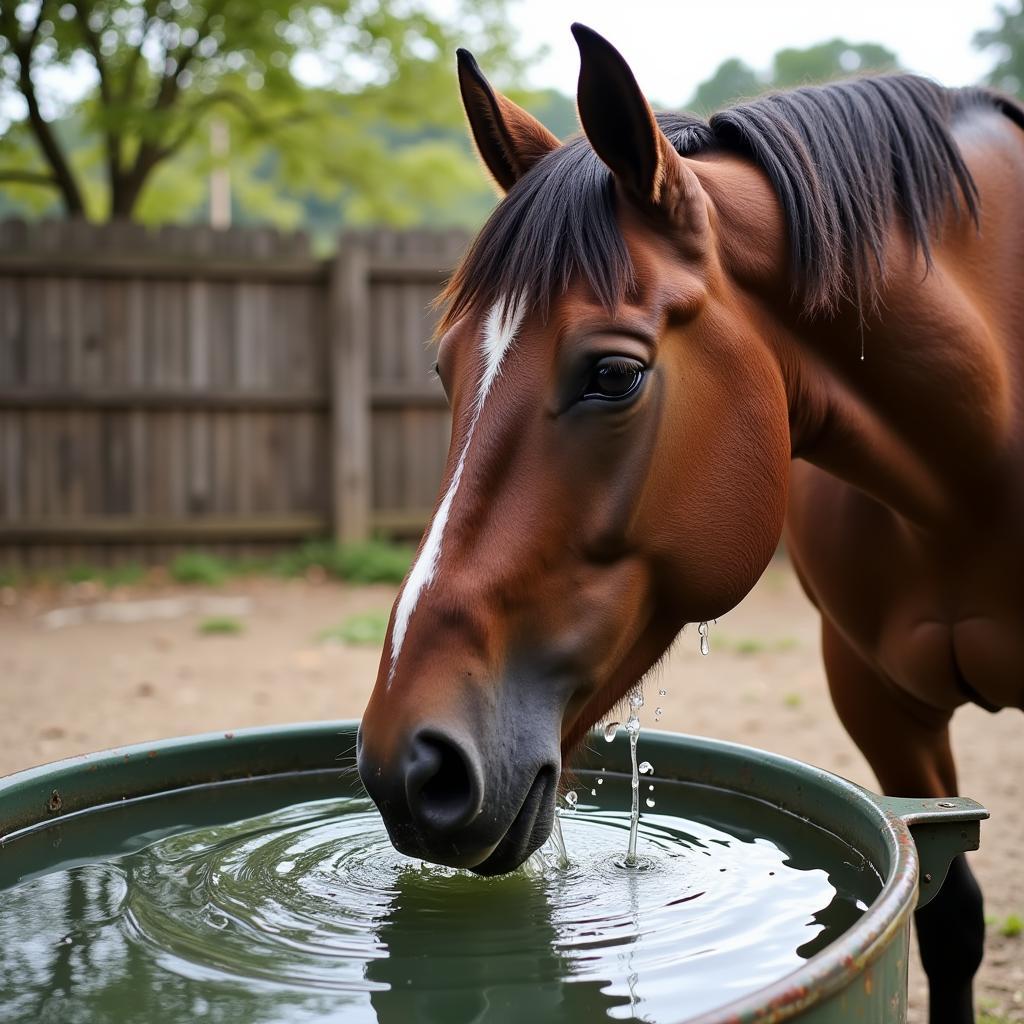Having a horse in your backyard is a dream for many equestrians. It offers the convenience of daily interaction and personalized care. However, responsible horse ownership in a residential setting requires careful planning and commitment. This guide covers essential aspects of keeping a horse in your backyard, ensuring both the horse’s well-being and harmonious coexistence with your neighbors.
Essential Considerations for a Backyard Horse
Before bringing a horse home, assess your property’s suitability. Adequate space is crucial, not just for a shelter but also for turnout. Consider the local zoning regulations, which may dictate the minimum acreage required per horse. Think about manure management; a proper system is essential to prevent environmental issues and unpleasant odors. Finally, secure fencing is paramount for the horse’s safety.
 Safe and Secure Backyard Horse Paddock Fencing
Safe and Secure Backyard Horse Paddock Fencing
Providing Shelter and Pasture for Your Horse
Horses need shelter from the elements. A three-sided run-in shed provides basic protection, while a stable offers more comprehensive shelter and storage. Pasture management is vital for providing adequate forage. Rotate grazing areas to prevent overgrazing and promote healthy grass growth. Supplement grazing with hay, especially during winter or periods of drought. If you are interested in arena surfaces, check out our guide on horse arena surfaces.
Water and Nutrition: Key to a Healthy Horse
Fresh, clean water should be available at all times. Install automatic waterers for convenience or provide multiple water troughs. A balanced diet is essential for maintaining a horse’s health. Consult an equine nutritionist to determine the appropriate feed and supplements based on your horse’s age, workload, and individual needs.
 Hydrated Horse Drinking From a Water Trough
Hydrated Horse Drinking From a Water Trough
Horse Care and Maintenance in Your Backyard
Regular hoof care is crucial. Schedule farrier visits every 6-8 weeks for trimming and shoeing. Grooming not only keeps your horse looking its best but also allows you to check for injuries and skin conditions. Vaccinations and deworming are essential for preventative healthcare. Consult your veterinarian to establish a suitable vaccination and deworming schedule. A relaxing way to connect with your horse can be found with a horse cuff bracelet.
Enrichment and Exercise: Keeping Your Backyard Horse Happy
Horses are social animals and need interaction. Provide companionship through another horse, a donkey, or other suitable livestock. Ensure adequate exercise through turnout, riding, or lunging. Environmental enrichment, such as toys and varied terrain, can prevent boredom and promote mental stimulation. Maybe an inflatable world horse would provide some extra fun!
Is a Horse Right for Your Backyard?
- Space: Do you have enough land to meet your horse’s needs?
- Time: Can you dedicate sufficient time for daily care and interaction?
- Finances: Are you prepared for the ongoing costs of feed, vet care, and farrier services?
- Regulations: Are you aware of and compliant with local zoning ordinances?
“A happy horse is a healthy horse,” says renowned equine veterinarian Dr. Emily Carter. “Providing a stimulating and enriching environment is just as important as meeting their basic physical needs.”
Another expert, John Davies, a seasoned horse trainer with over 30 years of experience, adds, “Remember that horses are social creatures. Companionship is crucial for their mental well-being.” Consider an outdoor rocking horse for children to enjoy alongside their equine companion.
Keeping a horse in your backyard is a rewarding experience. By careful planning, providing appropriate care, and staying informed, you can enjoy the many benefits of having a horse close to home. Perhaps even a battat our generation horse would be a good start for young aspiring equestrians.
FAQ
- What is the minimum acreage required for a horse? This varies depending on local regulations.
- What type of fencing is best for horses? Sturdy wooden or vinyl fencing is recommended.
- How often should a horse see a farrier? Every 6-8 weeks.
- What is the average cost of keeping a horse? This depends on location and individual needs.
- What are the signs of a healthy horse? Bright eyes, shiny coat, good appetite, and regular bowel movements.
- What kind of shelter does a horse need? A three-sided run-in shed or a stable.
- How much water does a horse drink per day? 10-12 gallons.
For further assistance, please contact us at Phone Number: 0772127271, Email: [email protected] or visit us at QGM2+WX2, Vị Trung, Vị Thuỷ, Hậu Giang, Việt Nam. We have a 24/7 customer service team.